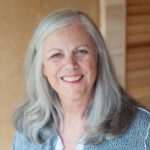 Marsha Faubert (2018) came to King’s thinking she needed to work on her writing style. But as she studied with mentors, she came to understand her style was “one of the gifts I brought to the table, and I should stop being so dismissive of it.” What she needed to work on instead was “figuring out a structure” for her MFA project.
Marsha Faubert (2018) came to King’s thinking she needed to work on her writing style. But as she studied with mentors, she came to understand her style was “one of the gifts I brought to the table, and I should stop being so dismissive of it.” What she needed to work on instead was “figuring out a structure” for her MFA project.
That project is now Wanda’s War: An Untold Story of Nazi Europe, Forced Labour, and a Canadian Immigration Scandal, slated for publication in February 2023 by Goose Lane. It tells the story of Faubert’s mother-in-law, Wanda Gizmunt, who survived a Nazi forced labour camp and became a displaced person after the war, before coming to Canada as one of 100 young Polish women sent over to fill a labour shortage at a small-town Quebec textile mill. There, she and the others became cheap labour, forced to live on-site with very few freedoms.
Faubert was only “vaguely aware” of Wanda’s story. By the time she decided to write about it, both Wanda and her husband, Kazimierz (Casey) Surdykowski, had died, which complicated Faubert’s research. “We didn’t even have the barest of facts about their lives: where they grew up, even what their birthdays were. So I was starting from scratch,” she says. As she worked on the book, “the story expanded to include an investigation of what it was like to be both in the Soviet Union [as her father-in-law was] and in Nazi Germany as a forced labourer, what the whole displacement situation was in the post-war period and what was happening in Canada with respect to immigration.”
A lawyer by training, Faubert served as a workers’ compensation adjudicator for decades. Then she found herself at a career crossroads, and “wasn’t really happy with any of the options.” She took a few writing courses and tried her hand at short fiction, but quickly realized “I was just not going to be very good at that.” During one of her courses, she’d written an essay about Wanda, and she started to think about expanding it into a book. After editor Susan Scott and writer Moira Dann (MFA 2015) both recommended the King’s MFA in Creative Nonfiction, she signed up.
Unlike students who choose mentors with a similar style, Faubert opted to work with Jane Silcott and Harry Thurston because “they’re very lyrical writers. They’re beautiful writers.” As someone who had written countless legal documents, she was “hoping some of that would rub off on me.” Instead, they helped her appreciate her own voice.
After graduating, Faubert still hadn’t finished the book, but she entered her proposal into the Penguin Random House Canada MFA Prize, and was shortlisted. Urged to take advantage of the moment, she pitched Wanda’s War to agents, and eventually directly to Goose Lane.
Faubert says for her, the importance of the MFA extends beyond helping her shape her book and find a publisher. She has stayed in touch with her former mentor group, and continues to be in a writing group with two other women who went through the King’s program. The MFA “placed me in a writing community that I wouldn’t have found otherwise,” she says. “That has been really significant to me.”

